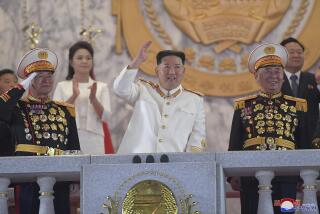A Tardy Tribute
- Share via
For three years beginning in mid-1950, the United States committed millions of men and billions of dollars to an international effort that prevented the conquest of South Korea by the Communist regime to its north. That undertaking initially commanded broad support among the American people. In time, though, it became both a subject of major domestic political controversy and, even as it was still being fought, a matter of increasing public apathy. A conflict that produced some of the most dramatic and heroic episodes in U.S. military history and--after China intervened with its forces in late 1950--did much to set the course of Sino-American relations for the next two decades, eventually came to be thought of as the Forgotten War.
It would be more proper, of course, to see the conflict in Korea as one that has been simply neglected in American historical consciousness. For certainly it has not been and never will be forgotten by those who fought there, or by the families of the dead, the wounded and the missing, or by the hundreds of thousands of U.S. servicemen who subsequently were assigned to South Korea to help safeguard that country’s security, an obligation that continues to this day.
Curiously, in this nation that tends to be both generous and sometimes not too choosy in erecting monuments to events and persons both great and insignificant, U.S. participation and sacrifices in the Korean War have never received adequate official national recognition. That oversight is at last about to be corrected. If the final $2.8 million that is needed for a privately funded $6-million memorial can soon be raised, a 2-acre site across the reflecting pool from the Vietnam Veterans Memorial in Washington, D.C., could be dedicated by June 25, 1991, the 41st anniversary of North Korea’s invasion of South Korea.
More than 54,000 Americans died in the Korean War, of whom 33,629 were killed in action. Another 103,284 were wounded; of these, more than 2,000 subsequently died. The missing in action totaled 5,866, and more than 2,700 men died in captivity. When the war was over, those who had fought came home and for the most part, without parades or speeches or other ceremony, quietly reintegrated themselves into civilian life. The nation has been too long in suitably remembering the services they performed.
More to Read
Sign up for Essential California
The most important California stories and recommendations in your inbox every morning.
You may occasionally receive promotional content from the Los Angeles Times.













